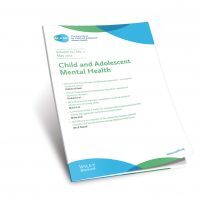Journal article
-

Prospective association between evening circadian preference and academic functioning in adolescents: the role of daytime sleepiness
Open Access paper from the JCPP – “There is growing evidence for the role of circadian factors in adolescents’ sleep and academic adjustment, with greater evening preference being linked to poorer academic functioning. However, studies have yet to evaluate this association prospectively in adolescence, nor have studies examined daytime sleepiness as a putative mechanism linking evening preference to poor academic functioning”. Joseph W. Fredrick (pic) et al.
Read more -

Internet-delivered therapist-assisted cognitive therapy for adolescent social anxiety disorder (OSCA): a randomised controlled trial addressing preliminary efficacy and mechanisms of action
Open Access from the JCPP – “Forty-three youth (14–18 years) with SAD recruited through schools were randomly allocated to therapist-assisted Internet-delivered CT-SAD or waitlist for 14 week”. Eleanor Leigh (pic) and David M. Clark
Read more -

Early neurodevelopmental problems and risk for avoidant/restrictive food intake disorder (ARFID) in 4-7-year-old children: A Japanese birth cohort study
Open Access paper from JCPP Advances – “We examined the occurrence of early NDPs in 4–7-year-old children with suspected ARFID and how predictive early NDPs are of ARFID”. Lisa Dinkler et al.
Read more -

Review: System transformation to enhance transitional age youth mental health – a scoping review
Paper from the CAMH journal – “Youth mental health challenges are an emerging and persistent global public health issue despite efforts for improvement”. Joseph Adu et al.
Read more -

Editorial Perspective: A perfect storm – how and why eating disorders in young people have thrived in lockdown and what is happening to address it
Open Access paper from the JCPP – “The number of children and young people referred to community eating disorders services escalated dramatically shortly after onset of the Covid-19 pandemic. Many presented with medical instability following restrictive eating and needed acute hospitalisation to correct malnutrition”. Dasha Nicholls (pic)
Read more -

Russian adolescent mental health in 2002, 2015 and during the COVID-19 pandemic in 2021
Paper from the CAMH journal – Cross-sectional school-based surveys of 12- to 18-year-olds were carried out in a Siberian city using the Strengths and Difficulties Questionnaire, data on tobacco, alcohol and drug use and socio-demographic information. We examined the effect of cohort, gender, family composition and parental occupation on mental health and substance use. Helena R. Slobodskaya et al.
Read more -

Contemporary screen time modalities and disruptive behavior disorders in children: a prospective cohort study
Paper from the JCPP – “This study’s objective was to determine the prospective associations of contemporary screen time modalities with conduct and oppositional defiant disorder in a national cohort of 9–11-year-old children”. Jason M. Nagata (pic) et al.
Read more -

Psychological legacies of intergenerational trauma under South African apartheid: Prenatal stress predicts greater vulnerability to the psychological impacts of future stress exposure during late adolescence and early adulthood in Soweto, South Africa
We evaluate the intergenerational effects of prenatal stress experienced during apartheid on psychiatric morbidity among children at ages 17–18 and also assess the moderating effects of maternal age, social support, and past household adversity. Andrew Wooyoung Kim (pic) et al. Includes podcast link
Read more -

Latent class analysis to characterize neonatal risk for neurodevelopmental differences
Open Access paper from the JCPP – “Neonatal risk factors, such as preterm birth and low birth weight, have been robustly linked to neurodevelopmental deficits, yet it is still unclear why some infants born preterm and/or low birth weight experience neurodevelopmental difficulties while others do not”. Allison M. Momany (pic) et al.
Read more -

Mother’s and children’s ADHD genetic risk, household chaos and children’s ADHD symptoms: A gene–environment correlation study
Open Access paper from the JCPP – “Chaotic home environments may contribute to children’s attention-deficit hyperactivity disorder (ADHD) symptoms. However, ADHD genetic risk may also influence household chaos”. Jessica C. Agnew-Blais (pic) et al.
Read more